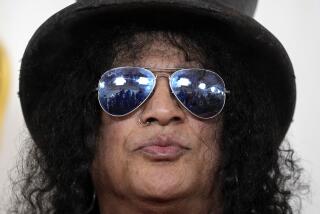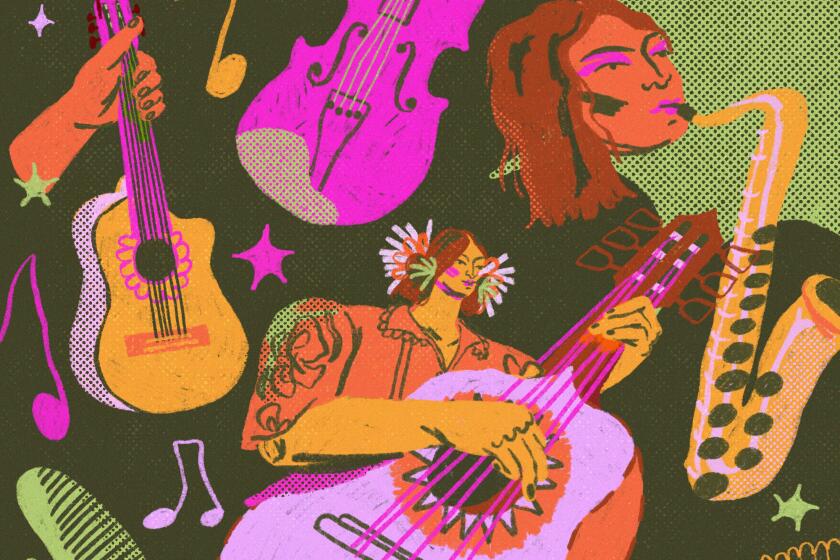After the Oakland Ghost Ship fire, Kennedy Ashlyn finds hope with her new electronic project SRSQ
The last time Kennedy Ashlyn went back to her old city of Oakland, she didn’t know how she’d feel. The singer for the new electronic project SRSQ, and co-founder of the band Them Are Us Too, happened to return to the city on a very difficult anniversary, but she was surprised at the normalcy of everything.
“Being there is like being in a weird dream,” she said. “It should feel bad and intense, but it doesn’t. You’re out with friends at a bar or shopping at Whole Foods, and it almost feels like it didn’t happen. But it did.”
In November of 2016, Ashlyn lost her Them Are Us Too bandmate Cash Askew in the Ghost Ship fire that claimed dozens of lives in an underground Oakland music venue and art space. In one tragic night, the tight-knit scene lost 36 artists, friends and loved ones that it seemed almost impossible for those who lived through it to go on.
But now, years later, some of the artists affected by it are rebuilding their lives and work. With SRSQ’s debut LP, “Unreality,” due Oct. 26, Ashlyn has made a deeply moving document of loss, and a testament to resilience in the face of the unthinkable.
For months after Ghost Ship, Ashlyn was near-paralyzed with grief. Her and Askew had been best friends and collaborators since they were teenagers (she’s now 25).
Together, Them Are Us Too earned early acclaim for Kennedy’s plaintive, powerful vocals and Askew’s melancholy guitar and misty production work. After releasing their debut “Remain” on the L.A.-based Dais Records, they were midway through finishing their second LP when the fire struck.
For nearly a year, as Ashlyn tried to grasp the scale of that loss, the idea of returning to music was a comfort and yet profoundly frightening.
I didn’t touch music for months. In the end, it was therapeutic, but the prospect of accessing those emotions was terrifying.
— Kennedy Ashlyn
“I didn’t touch music for months. In the end, it was therapeutic, but the prospect of accessing those emotions was terrifying,” she said. “Writing was how I processed losing Cash and the trauma in Oakland. The only way for me to cope was to try and match sound to that feeling. Music created a space for those feelings to exist that wasn’t excruciating.”
Over the next year, music gave her a structure to come to terms with what happened and a place for hope in spite of it. From her home in Texas (where she had moved a year before the fire), she worked to posthumously finish Them Are Us Too’s final album, “Amends.” But new songs also began to take shape, one by one. Some alluded to the bottomless well of loss; others explored how her sense of memory and self had been forever changed since.
But perhaps unexpectedly, they were big, regal songs. Ashlyn’s voice always drove her band — she has Kate Bush’s tone and Florence Welch’s virtuosity. But now, with nothing left to lose, she’s made her most forceful and intricate music yet in SRSQ.
On singles such as “The Martyr” and “Cherish,” Ashlyn put thundering electronic drums beneath waves of synthesizer noise — enormous-sounding but always shot through with introspection and tenderness. She worked with the Bay Area techno producer Inhalt to help build the album’s deep, pristine layers of production.

Ashlyn says that it was daunting to let another artist into her craft (and her life) after the loss of Askew. But in the end, collaborating was a way to start believing in the world again.
“It was a leap of faith, having the trust to let anyone else in,” she said. “You had to trust that it would work without knowing that it would.”
SRSQ also marks her return to the stage — next month, she’s playing the second Cloak and Dagger festival (a goth-leaning, techno-adjacent show) in downtown L.A. Ashlyn said that performing live again comes with its own range of emotions — on one hand, the validation of knowing her voice and vision will carry on in spite of everything, as well as the loneliness of being in front of crowds without her best friend.
“Playing shows is back to being a comfort, but for a while, it felt like such a black hole, looking to my right and seeing no one there,” she said.
Ghost Ship shattered the lives of so many, both those it claimed and those who have to move forward after. Oakland will be forever scarred, even if it sometimes feels normal to walk its streets again. As its artists shape their futures, whether in the ever-pricier and difficult city or elsewhere, they’ll keep finding ways to write and perform and live. The conditions that necessitated places such as Ghost Ship drove its young artists to the margins. But it didn’t make them disappear.
“The biggest thing a city can do is to not price out residents. Watching artists be pushed out of places I’ve lived and loved is devastating,” Ashlyn said. “But the depth and richness of our community isn’t going anywhere.”
For breaking music news, follow @augustbrown on Twitter.
More to Read
The biggest entertainment stories
Get our big stories about Hollywood, film, television, music, arts, culture and more right in your inbox as soon as they publish.
You may occasionally receive promotional content from the Los Angeles Times.











